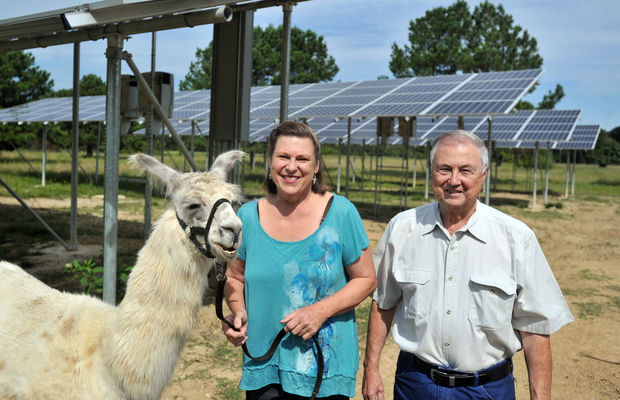COZY COVE SOLAR
GURLEY, Alabama One-hundred alpacas, 20 llamas, four cats, three ducks, two horses and one dog. That's how many animals Tony and Cozette O'Neil nurture each day at their 54-acre farm nestled under two 100-year-old oak trees in rural Madison County.
The retired NASA mission manager and his wife, who was self-employed, had other plans for their retirement when they designed and built their dream home in Hampton Cove two decades ago.
But the gentle dispositions, smiling faces and social personalities of the alpaca species have made every moment at the lively farm on Miller Road worth waking up for each morning since March of 1995.
"It's heaven on earth – it really is," Cozette said Monday as she watched a group of alpacas loaf about in the mid-morning sunlight. "I shouldn't say that, because I don't know if heaven would be any better than this. I just love the animals. It's been the best thing that ever happened to us."
Going Solar
The rural homestead is unique, however, not just for its herds of alpacas and llamas. Cozy Cove Farm was recently converted to a solar-powered farm and is generating its own electricity to be sold to the Tennessee Valley Authority at above-market prices.
Cozy Cove Solar started with a USDA Rural Energy for America Program grant valued at more than $40,000. Tony, who began the project in June 2012, also received $20,500 from AlabamaSAVES to buy down the cost of the interest rate.
The solar-power generation system, which cost more than $160,000 to build, has already converted more than 41,000 kilowatts of power and produced $9,099 worth of electricity at a TVA rate of 22 cents per kilowatt hour.
"I am receiving each year from my federal taxes approximately $7,500 until the total comes to 30 percent of the cost of the project or $48,753," Tony said. "This will take six and ½ years to recover the $48,753. When all of the money comes in, it will total
$109,901."
The solar-power generation system, which took about a month to construct, was activated in late February. When sunlight hits the solar panels, a direct current of electricity is generated and transferred to on-site inverter boxes. The current is then moved underground into a transformer or grid.
"Essentially, my neighbors are using the electricity that the system is generating," said Tony, whose 2012 electric Chevrolet Volt is also powered by the new system.
Tony, who expects to earn about $15,000 per year by selling his electricity to TVA, said his solar-power generation system is an eco-friendly project that puts less CO2 into the atmosphere.
"I do think ultimately it helps us have a cleaner environment and helps us get off foreign oil, which is my greatest desire – for us to be energy independent," he said.
For the love of alpacas
Soon after moving into their perfect house in Hampton Cove in 1993, Cozette discovered her love of horses, sparking the couple's desire to begin taking horseback riding lessons. Within a year, Tony and Cozette owned three American Saddlebread horses and purchased a 24-acre farm with an old barn to board the animals.
Their new life together began two years later when they bought the adjoining 22-acre farm with a small farm house. They then sold their Hampton Cove home and moved into the Gurley house, which has been expanded with new amenities and is now 4,000 square feet.
Two months later, the couple spotted their first sheared alpaca in the back of a van while on the Interstate in Tennessee. They motioned for the driver to pull over and learned about a Pet Expo, where alpacas would be for sale, to be held the following week in Knoxville.
The rest is history for the longtime Huntsville couple that raises llamas and alpacas for their soft, single-coated fiber.
"We both grew up in town, in Memphis, lived in South Huntsville where we raised our kids and never thought about having a farm," Cozette said.
Into the future
Chris O'Neil, son of Tony and Cozette and facilities projects manager for the City of Huntsville, travels to his family's farm two or three times a month and brings his three sons to help around the homestead.
"They enjoy going out to the farm and seeing all the animals," he said. "They're finally at an age where they can actually give us a hand."
Chris and his brother, Daniel, an engineer with NASA, haven't decided who will take over the farm in the future, but are excited about the prospects a solar-power generation system bring to the table.
"When that day comes, my brother and I will inherit the farm, but I don't think any decision has been made at this time about whether or not we're going to raise alpacas," he said. "We will have to decide at that time. They've done such an outstanding job over the last 20 years they have had that farm and they've made a huge amount of improvement there."
